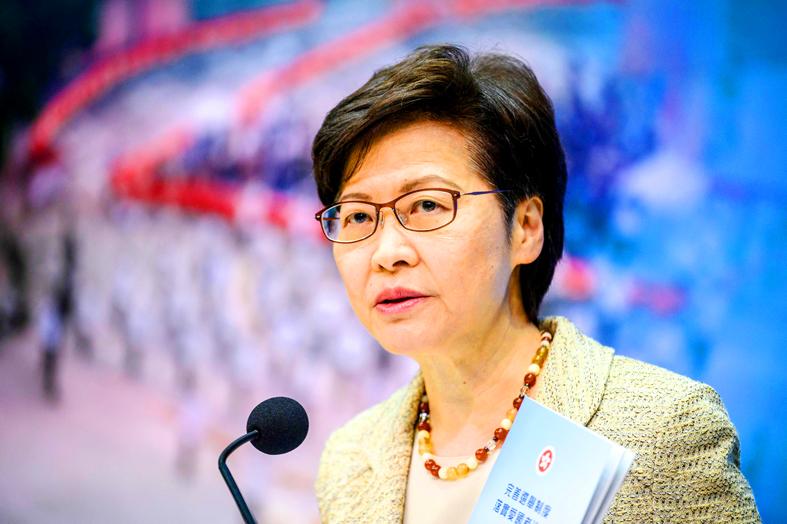Chinese leaders yesterday imposed a sweeping overhaul of Hong Kong’s electoral system, creating powers to vet anyone standing for public office and slashing the number of directly elected legislators.
The new measures, which bypassed the Hong Kong Legislative Council and were imposed directly by Beijing, are the latest move aimed at quashing the territory’s democracy movement after huge protests.
Chinese President Xi Jinping (習近平) signed the new law after it was unanimously approved by the Standing Committee of the National People’s Congress.

Photo: AFP
One of the most dramatic changes is the introduction of a committee that is to vet for their patriotism anyone hoping to enter Hong Kong politics.
It is to include background checks by the territory’s new national security apparatus and its decisions cannot be legally challenged.
“The National Security Committee and the National Security Police will provide reports on every single candidate to assist the vetting by the qualification review committee,” said Tam Yiu-chung (譚耀宗), Hong Kong’s sole delegate to the National People’s Congress Standing Committee.
When Hong Kongers are allowed to vote in limited local elections, they tend to do so overwhelmingly for pro-democracy candidates, something that has rattled Beijing.
Under the new measures, the Hong Kong Legislative Council is to be expanded from 70 to 90 seats, but only 20 of those seats would be directly elected, down from 35.
That brings direct representation down from half to less than one-quarter of the seats.
The majority — 40 seats — are to be chosen by a reliably pro-Beijing committee. The remaining 30 are to be picked by “functional constituencies” — bodies representing certain industries and special interest groups that have also been historically loyal to Beijing.
The measures were welcomed by the Hong Kong government, which would no longer have to face a disruptive pro-democracy opposition in the council.
“The excessive politicization in society and the internal rift that has torn Hong Kong apart can be effectively mitigated,” Hong Kong Chief Executive Carrie Lam (林鄭月娥) said.
The next legislative elections under the new system are to be held in December, she said.
“Hong Kong’s institutions of political power and governance must always be firmly in the hands of those who love the motherland and Hong Kong,” the Hong Kong and Macau Affairs Office said.
Opposition politicians took a less rosy view, describing the new measures as a clear move to ensure that any remaining opposition to Beijing’s rule is stamped out.
“This whole new system is really degrading and very oppressive,” former Hong Kong legislator Emily Lau (劉慧卿) said.
Lau questioned whether Hong Kongers would want to partake in elections and warned that political unrest could explode again.

The Ministry of the Interior (MOI) is to tighten rules for candidates running for public office, requiring them to declare that they do not hold a Chinese household registration or passport, and that they possess no other foreign citizenship. The requirement was set out in a draft amendment to the Enforcement Rules of the Public Officials Election and Recall Act (公職人員選舉罷免法 ) released by the ministry on Thursday. Under the proposal, candidates would need to make the declaration when submitting their registration forms, which would be published in the official election bulletin. The move follows the removal of several elected officials who were

The Republic of China (ROC) is celebrating its 114th Double Ten National Day today, featuring military parades and a variety of performances and speeches in front of the Presidential Office in Taipei. The Taiwan Taiko Association opened the celebrations with a 100-drummer performance, including young percussionists. As per tradition, an air force Mirage 2000 fighter jet flew over the Presidential Office as a part of the performance. The Honor Guards of the ROC and its marching band also heralded in a military parade. Students from Taichung's Shin Min High School then followed with a colorful performance using floral imagery to represent Taiwan's alternate name

FOUR DESIGNATED AREAS: Notices were issued for live-fire exercises in waters south and northwest of Penghu, northeast of Keelung and west of Kaohsiung, they said The military is planning three major annual exercises across the army, navy and air force this month, with the navy’s “Hai Chiang” (海強, “Sea Strong”) drills running from today through Thursday, the Ministry of National Defense said yesterday. The Hai Chiang exercise, which is to take place in waters surrounding Taiwan, would feature P-3C Orion maritime patrol aircraft and S-70C anti-submarine helicopters, the ministry said, adding that the drills aim to bolster the nation’s offshore defensive capabilities. China has intensified military and psychological pressure against Taiwan, repeatedly sending warplanes and vessels into areas near the nation’s air defense identification zone and across

A Chinese takeover of Taiwan would severely threaten the national security of the US, Japan, the Philippines and other nations, while global economic losses could reach US$10 trillion, National Security Council Deputy Secretary-General Lin Fei-fan (林飛帆) wrote in an article published yesterday in Foreign Affairs. “The future of Taiwan is not merely a regional concern; it is a test of whether the international order can withstand the pressure of authoritarian expansionism,” Lin wrote in the article titled “Taiwan’s Plan for Peace Through Strength — How Investments in Resilience Can Deter Beijing.” Chinese President Xi Jinping’s (習近平) intent to take Taiwan by force